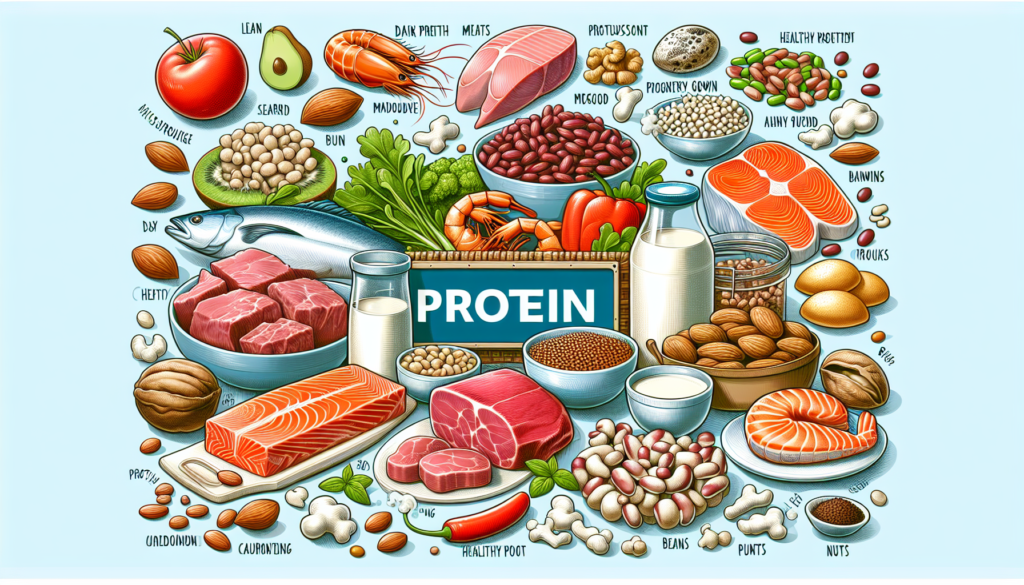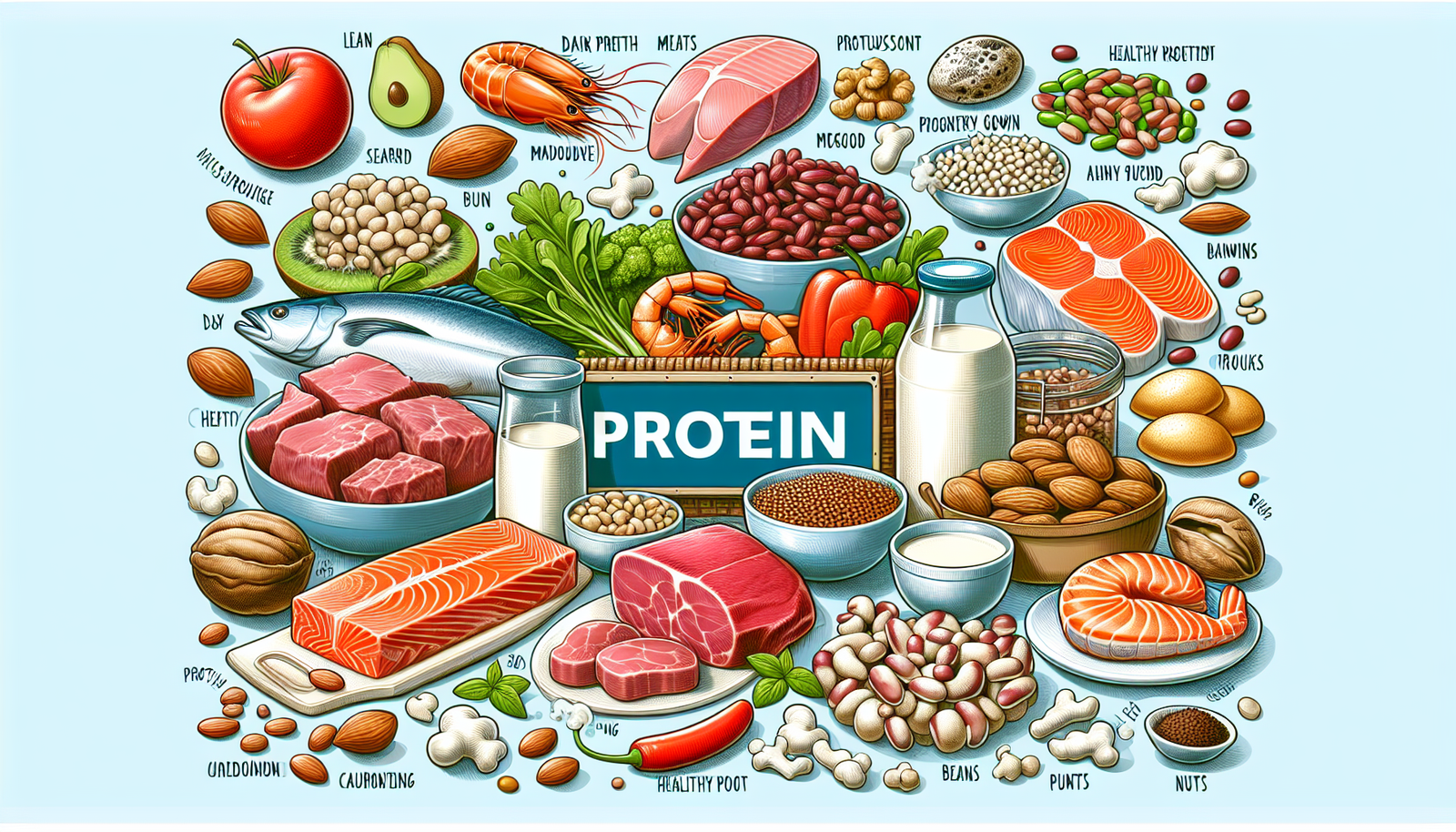Including protein-rich foods in your diet is not only essential for overall health and well-being, but it also plays a crucial role in the growth, repair, and various body processes. These high-quality proteins can be derived from both plant and animal sources, such as lean meats, fish, dairy products, beans, nuts, seeds, eggs, quinoa, and soy products. To meet your daily protein needs and obtain other essential nutrients, it is important to consume a variety of protein-rich foods. While animal sources of protein provide complete proteins with all essential amino acids, most plant-based proteins are incomplete. Emphasizing plant-based protein and protein from a variety of sources, like the Mediterranean style of eating, can offer numerous health and nutritional benefits. However, it is important to maintain a well-rounded diet that includes a balance of macronutrients for overall health and to avoid consuming excessive protein, as it may lead to dietary imbalances and potential health risks.

The Importance of Protein in Your Diet
Protein is an essential component of a healthy diet. It serves as the building blocks for our body, aiding in growth, repair, and various important body processes. Including protein-rich foods in your diet is crucial for overall health and well-being. In this article, we will discuss the significance of protein in your diet, different sources of protein, examples of high-protein foods, meeting daily protein needs, the concept of complete and incomplete proteins, recommended daily intake of protein, considerations when choosing protein sources, the benefits of emphasizing plant-based protein, and the importance of a well-rounded diet.
Proteins as Building Blocks
Proteins are the building blocks of our body. They are present in every cell and tissue, playing a crucial role in the growth and maintenance of our body. When we consume protein-rich foods, our body breaks down the proteins into amino acids, which are then used to build new proteins. Amino acids are essential for the development of muscles, bones, skin, and other tissues. They also serve as a source of energy when needed.
Growth and Repair
Proteins are vital for the growth and repair of our body. They are involved in the production and regulation of enzymes, hormones, and antibodies, which are responsible for various physiological processes. During periods of growth, such as childhood and adolescence, consuming adequate amounts of protein is particularly important to support rapid growth and development. Additionally, protein is essential for repairing damaged tissues, such as muscles after exercise or injuries.
Various Body Processes
Proteins are involved in various body processes, ensuring the proper functioning of our body. They play a crucial role in maintaining the balance of fluids, as they help regulate the amount of water in our cells and tissues. Proteins are also responsible for transporting important molecules, such as oxygen in our blood or nutrients across cell membranes. They participate in the immune system by producing antibodies that defend our body against infections. Additionally, proteins are involved in numerous chemical reactions, serving as enzymes that catalyze biochemical reactions in our body.
Sources of Protein
Proteins can be obtained from both plant and animal sources. Including a variety of protein sources in your diet ensures that you get all the essential amino acids required for optimal nutrition.
Plant-Based Proteins
Plant-based proteins are an excellent choice for individuals who follow a vegetarian or vegan diet, or those looking to reduce their intake of animal products. Legumes, such as beans, lentils, and chickpeas, are rich in protein and can be easily incorporated into various dishes. Grains, such as quinoa and whole wheat, also provide a good amount of protein. Additionally, vegetables like spinach, broccoli, and peas, contain a decent amount of protein. Nuts and seeds, such as almonds, chia seeds, and hemp seeds, are also a great source of plant-based protein.
Animal-Based Proteins
Animal-based proteins are commonly consumed in many diets and provide complete proteins that contain all the essential amino acids our body needs. Lean meats, such as chicken, turkey, and lean cuts of beef, are excellent sources of protein. Fish, such as salmon, tuna, and trout, are not only high in protein but also provide omega-3 fatty acids, which are essential for heart health. Dairy products, including milk, yogurt, and cheese, are rich in protein and also a good source of calcium. Eggs are another nutritious option, providing high-quality protein along with vitamins and minerals.
Examples of High-Protein Foods
There are numerous high-protein foods available that can be easily incorporated into your diet. Here are some examples of high-protein foods:
Lean Meats
Lean meats, such as chicken breast, turkey, and lean cuts of beef, are excellent sources of protein. They provide high-quality protein along with essential vitamins and minerals.
Fish
Fish, such as salmon, tuna, and trout, are not only high in protein but also rich in omega-3 fatty acids, which have numerous health benefits, including reducing the risk of heart disease.
Dairy Products
Dairy products, including milk, yogurt, and cheese, are not only a good source of protein but also provide essential nutrients like calcium, which is important for strong bones.
Beans
Legumes, such as beans, lentils, and chickpeas, are a plant-based source of protein. They are versatile ingredients that can be used in a variety of dishes and provide a good amount of protein along with fiber.
Nuts and Seeds
Nuts and seeds, such as almonds, chia seeds, and hemp seeds, are nutrient-dense and provide a decent amount of protein. They are also a good source of healthy fats and fiber.
Eggs
Eggs are a nutritional powerhouse, providing high-quality protein along with important vitamins and minerals. They can be prepared in various ways and are a versatile ingredient in cooking.
Quinoa
Quinoa is a grain that is not only high in protein but also rich in fiber and essential minerals. It is a great option for vegetarians and vegans looking for plant-based protein.
Soy Products
Soy products, such as tofu, tempeh, and edamame, are excellent sources of plant-based protein. They are also a good source of other nutrients like iron and calcium.

Meeting Daily Protein Needs
To meet your daily protein needs, it is important to consume a variety of protein-rich foods. This ensures that you get a good balance of different amino acids and obtain other essential nutrients as well. Including both plant-based and animal-based proteins in your diet can provide a range of benefits as each source of protein offers different nutritional profiles. For example, plant-based proteins often come with fiber, vitamins, and minerals, while animal-based proteins offer high-quality complete proteins.
Importance of Obtaining Other Essential Nutrients
When considering protein intake, it is crucial to look at the overall nutritional profile of the food. Fats, carbohydrates, vitamins, minerals, and other components are important considerations. For instance, lean cuts of meat provide protein along with essential vitamins and minerals, but they may also contain high levels of saturated fats. On the other hand, plant-based proteins come with beneficial fiber and nutrients but may lack certain vitamins or minerals. By choosing a variety of protein sources, you can ensure that you are obtaining a wide range of nutrients to support your overall health.
Complete and Incomplete Proteins
Proteins from animal sources, such as lean meats and dairy products, provide complete proteins. Complete proteins contain all the essential amino acids that our body needs for optimal functioning. On the other hand, most plant-based proteins are incomplete, meaning they lack one or more essential amino acids. However, by combining different plant-based protein sources, such as beans and rice, you can create a complete protein meal.
Recommended Daily Intake of Protein
The recommended daily intake of protein for the average adult is 0.8 grams per kilogram of body weight. This means that if you weigh 70 kilograms (155 pounds), you should aim for around 56 grams of protein per day. However, individual protein needs may vary based on factors such as age, activity level, and overall health. It is always a good idea to consult with a healthcare professional or a registered dietitian to determine your specific protein needs.
Considerations When Choosing Protein Sources
When choosing protein sources, it is important to consider the overall nutritional profile of the food. In addition to protein, you should also look at the fat content, carbohydrate content, vitamins, minerals, and other components. For example, a fatty cut of meat may provide a significant amount of protein, but it may also come with high levels of unhealthy saturated fats. On the other hand, plant-based proteins often come with beneficial fiber, but they may lack certain essential nutrients. By choosing a variety of protein sources, you can ensure that you are obtaining a wide range of nutrients and maintaining a balanced diet.
Emphasizing Plant-Based Protein
Emphasizing plant-based protein in your diet can have numerous benefits for your health and nutrition. Following a Mediterranean style of eating, which includes a variety of plant-based protein sources, has been linked to a decreased risk of heart disease, diabetes, and certain types of cancer. Plant-based proteins often come with additional nutrients like fiber, vitamins, minerals, and beneficial plant compounds. They can also be a more sustainable and ethical choice for individuals concerned about the environment and animal welfare. By incorporating plant-based proteins into your meals, you can enjoy the health benefits while still meeting your protein needs.
Specific Protein Needs
Some individuals may have specific protein needs that differ from the general population. For example, older adults often require a higher protein intake to maintain muscle mass and prevent age-related muscle loss. Including protein-rich foods in their diet can help support their health and mobility. Individuals trying to lose weight may also benefit from a higher protein intake, as protein can help promote satiety and prevent muscle loss during weight loss. Consulting with a healthcare professional or a registered dietitian can help determine your specific protein needs based on your unique circumstances.
Importance of a Well-Rounded Diet
While protein is an important macronutrient, it is essential to maintain a well-rounded diet that includes a balance of macronutrients – protein, carbohydrates, and fats – as well as a variety of vitamins and minerals from different food sources. Each macronutrient plays a specific role in our body, and an imbalance can lead to health issues. Therefore, focusing on a balanced diet that includes a variety of nutrient-dense foods is crucial for overall health. It is also important to remember that our dietary needs may change over time, so it is always beneficial to stay informed and adapt our choices accordingly.
In conclusion, protein is an essential component of a healthy diet, serving as the building blocks for our body and playing a crucial role in growth, repair, and various body processes. Including a variety of protein-rich foods in your diet is important to meet your daily protein needs and obtain other essential nutrients. Remember to choose a balance of plant-based and animal-based proteins, considering the overall nutritional profile of the food. Emphasizing plant-based protein, such as following a Mediterranean style of eating, can have numerous benefits for health and nutrition. Additionally, some individuals may have specific protein needs that differ from the general recommendations. A well-rounded diet that includes a balance of macronutrients and a variety of nutrient-dense foods is key to maintaining overall health.


